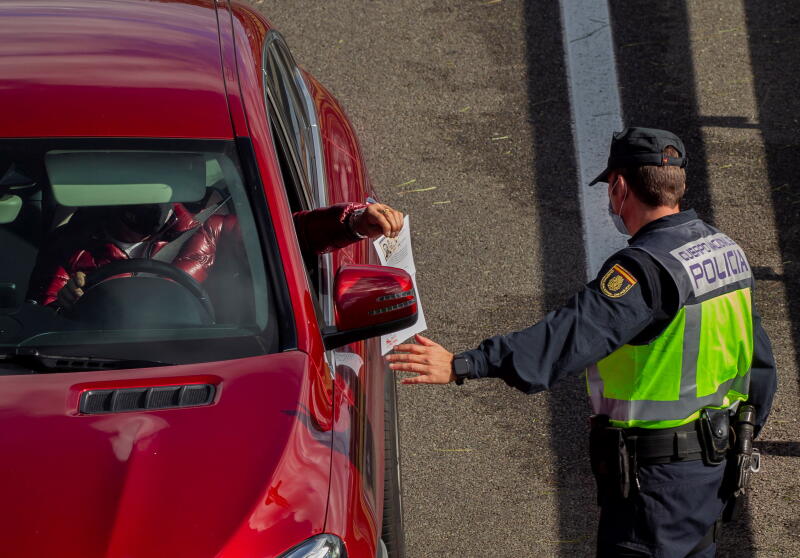Spain's Covid-19 state of emergency faces backlash
Sign up now: Get ST's newsletters delivered to your inbox

A driver shows a safe-conduct document to a police officer at a checkpoint in Asturias, Spain, on Oct 26, 2020.
PHOTO: EPA-EFE
Follow topic:
MADRID (REUTERS) - The Spanish government faced a backlash on Monday (Oct 26) over its plans to put the country, one of Europe's worst Covid-19 hotspots, under a state of emergency for six months.
Opposition parties said that was too long, epidemiologists said the move may be too little too late, and some citizens balked at nightly curfews.
"The curfew doesn't make much sense. Does the virus only infect people between 2300 and 0600? No," said Marta Aragoneses, a 36-year old schoolteacher, enjoying a cigarette outside a cafe in Madrid's historic La Latina neighbourhood.
Nearby, Mariano Moreno de Guerra, a pharmacist on his way to work, said what worried him was the length of the state of emergency and the powers it gave authorities.
"They are acquiring a taste for confining people and that could be dangerous. Extending it by six months is an absolute outrage. I see a lot of potential for abuse." The country's total number of cases soared by more than 50,000 over the weekend to reach 1,098,320 as of Monday, while the death toll is 35,031.
Disagreements between the minority central government, regional authorities and the opposition have for months hampered the response to the pandemic in Spain, and the curfew and state of emergency came after much political wrangling.
This has in turn angered many Spaniards, with analysts saying that the uncertainty could eventually hurt willingness to comply with the measures.
NATIONWIDE CURFEW
"The measures in Spain are reactive, dragging our feet, with the feeling that there's no evaluation of whether they work and that something is done only because others took those steps,"said political scientist Pablo Simon.
The government said on Sunday it would seek parliament's approval for the state of emergency, which provides the legal framework to take measures and gives each region the right to decide its own policy, to last six months.
Meanwhile, the nationwide curfew is set to last until at least Nov 9.
People are not allowed to move around between 11 pm and 6 am unless for specific reasons like work or medical trips. This applies to all of Spain, except the Canary Islands. Regions can start the curfew an hour earlier or delay it to midnight.
The state of emergency also allows regions to ban free transit in and out of their territory, and the northern regions of Aragon and Asturias became the first to do so on Monday.
Both the main opposition party, the conservative People's Party (PP), and the center-right Ciudadanos, said on Monday they would back a state of emergency, but not for six months.
PP leader Pablo Casado said his party would agree to as much as eight weeks but no more, and with conditions including legislative changes to allow for limits on the movement of people to be decided without resorting to a state of emergency.
Spain took harsher measures with the first wave of the pandemic from March more or less through to June, including a lockdown that obliged people to stay home during the day.

